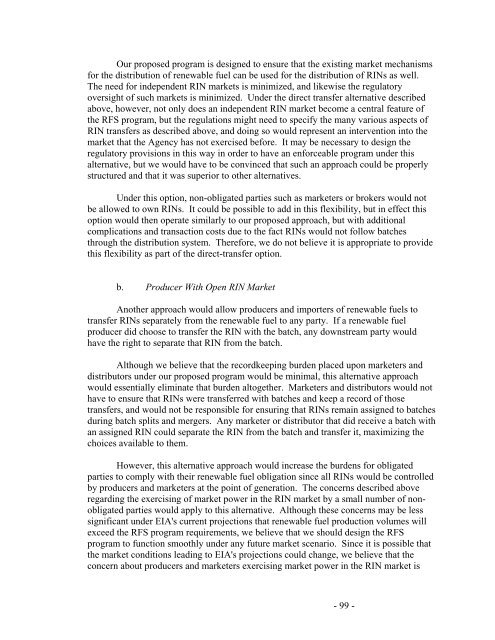Regulation of Fuels and Fuel Additives: Renewable Fuel Standard ...
Regulation of Fuels and Fuel Additives: Renewable Fuel Standard ...
Regulation of Fuels and Fuel Additives: Renewable Fuel Standard ...
Create successful ePaper yourself
Turn your PDF publications into a flip-book with our unique Google optimized e-Paper software.
Our proposed program is designed to ensure that the existing market mechanisms<br />
for the distribution <strong>of</strong> renewable fuel can be used for the distribution <strong>of</strong> RINs as well.<br />
The need for independent RIN markets is minimized, <strong>and</strong> likewise the regulatory<br />
oversight <strong>of</strong> such markets is minimized. Under the direct transfer alternative described<br />
above, however, not only does an independent RIN market become a central feature <strong>of</strong><br />
the RFS program, but the regulations might need to specify the many various aspects <strong>of</strong><br />
RIN transfers as described above, <strong>and</strong> doing so would represent an intervention into the<br />
market that the Agency has not exercised before. It may be necessary to design the<br />
regulatory provisions in this way in order to have an enforceable program under this<br />
alternative, but we would have to be convinced that such an approach could be properly<br />
structured <strong>and</strong> that it was superior to other alternatives.<br />
Under this option, non-obligated parties such as marketers or brokers would not<br />
be allowed to own RINs. It could be possible to add in this flexibility, but in effect this<br />
option would then operate similarly to our proposed approach, but with additional<br />
complications <strong>and</strong> transaction costs due to the fact RINs would not follow batches<br />
through the distribution system. Therefore, we do not believe it is appropriate to provide<br />
this flexibility as part <strong>of</strong> the direct-transfer option.<br />
b. Producer With Open RIN Market<br />
Another approach would allow producers <strong>and</strong> importers <strong>of</strong> renewable fuels to<br />
transfer RINs separately from the renewable fuel to any party. If a renewable fuel<br />
producer did choose to transfer the RIN with the batch, any downstream party would<br />
have the right to separate that RIN from the batch.<br />
Although we believe that the recordkeeping burden placed upon marketers <strong>and</strong><br />
distributors under our proposed program would be minimal, this alternative approach<br />
would essentially eliminate that burden altogether. Marketers <strong>and</strong> distributors would not<br />
have to ensure that RINs were transferred with batches <strong>and</strong> keep a record <strong>of</strong> those<br />
transfers, <strong>and</strong> would not be responsible for ensuring that RINs remain assigned to batches<br />
during batch splits <strong>and</strong> mergers. Any marketer or distributor that did receive a batch with<br />
an assigned RIN could separate the RIN from the batch <strong>and</strong> transfer it, maximizing the<br />
choices available to them.<br />
However, this alternative approach would increase the burdens for obligated<br />
parties to comply with their renewable fuel obligation since all RINs would be controlled<br />
by producers <strong>and</strong> marketers at the point <strong>of</strong> generation. The concerns described above<br />
regarding the exercising <strong>of</strong> market power in the RIN market by a small number <strong>of</strong> nonobligated<br />
parties would apply to this alternative. Although these concerns may be less<br />
significant under EIA's current projections that renewable fuel production volumes will<br />
exceed the RFS program requirements, we believe that we should design the RFS<br />
program to function smoothly under any future market scenario. Since it is possible that<br />
the market conditions leading to EIA's projections could change, we believe that the<br />
concern about producers <strong>and</strong> marketers exercising market power in the RIN market is<br />
- 99 -
















